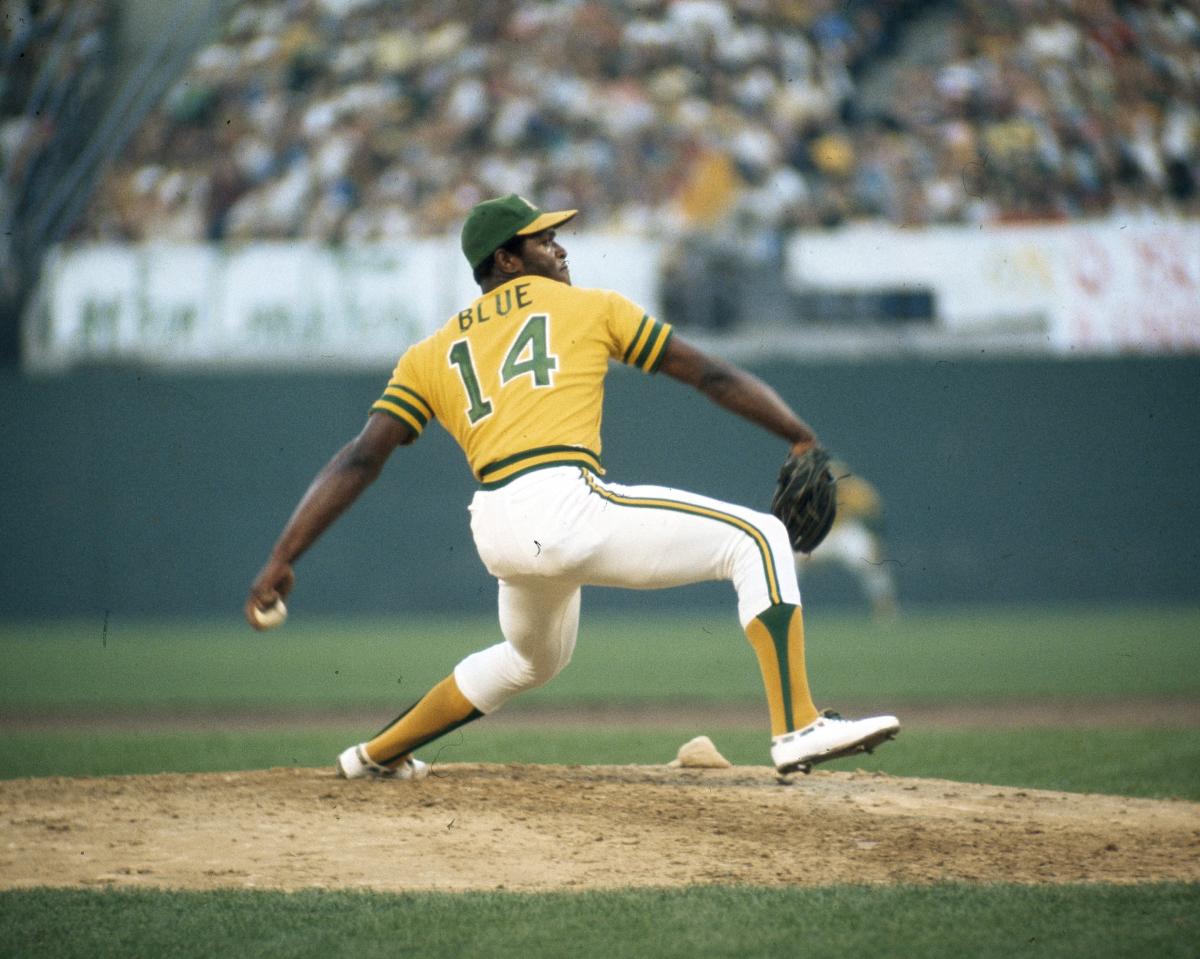Honoring MLB’s Black Aces: Vida Blue’s 24 Wins Revive Oakland A’s Success in 1971
In 2006, Jim “Mudcat” Grant authored a book called “The Black Aces: Baseball’s Only African-American Twenty-Game Winners,” which celebrated a select group of pitchers. These were the African American or Black Canadian pitchers who achieved the milestone of winning 20 or more games in a single MLB season.
At the time of the book’s release, there were 13 members of this esteemed group, each of whom was featured in a dedicated chapter. Jim Grant, the first Black pitcher to win 20 games in the American League, also included chapters on several Negro Leagues pitchers whom he believed would have reached this milestone if allowed to pitch in MLB. Since the book’s publication, two more pitchers, CC Sabathia in 2010 and David Price in 2012, have joined the ranks of the Black Aces.
In this series, Yahoo Sports is shining a spotlight on the stories of these Black Aces and the remarkable seasons that earned them a place in this exclusive fraternity.
Vida Blue, the 7th Black Ace, approached every game with a focus on the opposing pitcher rather than specific hitters. Even facing legends like Hank Aaron, Blue didn’t anticipate matchups with excitement, acknowledging the challenge they presented. He believed in the importance of pitching against other top aces to determine the best in the game, a practice less common in today’s baseball strategy of spacing out top pitchers for strategic advantage.
During his playing days, Blue’s managers arranged for him to pitch against formidable opponents like Nolan Ryan, Jim Palmer, Steve Carlton, and Tom Seaver, a setup that fueled his competitive spirit. Blue particularly cherished matchups against these renowned pitchers, using them as a yardstick to measure his performance.
One of Blue’s most memorable games was the 1971 MLB All-Star Game, where he faced Dock Ellis, marking the first time two Black pitchers started against each other in the event’s history. Despite both pitchers giving up home runs, Blue’s contributions helped secure a victory for the American League, a moment of pride and significance for him as part of baseball history.
Reflecting on the historic occasion, Blue expressed gratitude for the opportunity to make such an impact, underscoring the significance of being part of a groundbreaking moment in the sport’s diversity.
Baseball expert picks, predictions, and tips
Vida Blue’s Impact on the Oakland Athletics’ Revival
In the annals of baseball history, the Philadelphia Athletics stand as a towering monument of success, having claimed the World Series championship five times between 1910 and 1930. However, the franchise’s fortunes took a downturn after it moved to Kansas City in 1955 and subsequently to Oakland in 1968. Despite these relocations, the team struggled to recapture its former glory on the diamond.
Yet, a beacon of hope emerged for the Athletics just a year after settling in Oakland. Vida Blue, a young and talented pitcher, made his debut for the A’s on July 20, 1969, at the tender age of 19. Though his appearances were limited in his inaugural season, Blue’s potential was evident, setting the stage for his ascension to becoming the first Black Ace to don the Oakland uniform.
Blue’s meteoric rise continued into the following season when he showcased his exceptional pitching prowess by hurling his first no-hitter against the Minnesota Twins, securing a resounding 6-0 victory. Despite only making two starts, he finished his sophomore season with a perfect 2-0 record across six games, hinting at the brilliance that lay ahead.
However, it was the 1971 season that truly cemented Blue’s legacy in Major League Baseball. From the outset, he embarked on a remarkable winning streak, notching 17 victories in 21 starts before the All-Star break. With each outing, Blue carried two dimes in his pocket, serving as talismans of good luck and reminders of his lofty goal: to achieve 20 wins in a single season. As the season progressed, it became less a question of if Blue would reach this milestone and more a matter of when.
By the end of July, Blue had amassed two additional wins, positioning himself as one of the fastest pitchers in MLB history to reach the coveted 20-win mark. However, he faced a brief setback with two consecutive starts yielding less favorable results. Undeterred, Blue remained focused on his objective.
On August 7, 1971, Blue delivered a masterful performance against the Chicago White Sox, pitching a shutout and clinching his 20th victory of the season with a narrow 1-0 triumph. Despite encountering challenges early in the game, Blue showcased his resilience, particularly in the decisive ninth inning, where he recorded crucial strikeouts to secure the win. This achievement not only solidified his status as a Black Ace but also marked a historic moment for the Oakland Athletics franchise.
Reflecting on his monumental accomplishment, Blue emphasized the mental fortitude required to achieve such a feat. Winning the 20th game, he remarked, was particularly challenging due to the awareness of being on the brink of a significant milestone.
Blue’s remarkable success in 1971 was just the beginning of a storied career with the Athletics. He went on to amass 24 wins that season, earning him both the AL MVP and AL Cy Young awards. The following year, Blue played a pivotal role in leading the A’s to a World Series victory, setting the stage for further triumphs in the years to come.
Over the course of his illustrious 17-year career, Blue’s achievements extended beyond the baseball diamond. As a six-time All-Star, he became the first pitcher to represent both the American and National Leagues in the Midsummer Classic. Despite facing personal challenges, including a suspension from MLB, Blue remained resilient, leaving an indelible mark on the sport.
While Blue’s contributions to the Athletics’ success are undeniable, his legacy remains tinged with uncertainty. Despite his hopes of one day being enshrined in the Baseball Hall of Fame, he acknowledges the mistakes of his past and strives to reclaim his reputation.
In recounting his journey, Blue’s story serves as a testament to perseverance, redemption, and the enduring spirit of America’s pastime. As baseball enthusiasts reflect on his illustrious career, they are reminded of the transformative power of sport and the profound impact of individuals like Vida Blue on the game they love.







